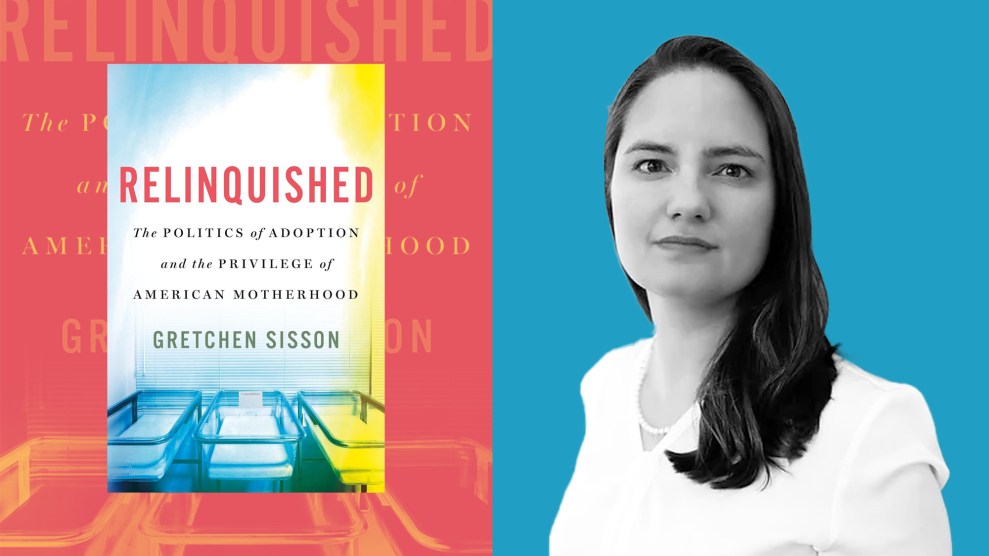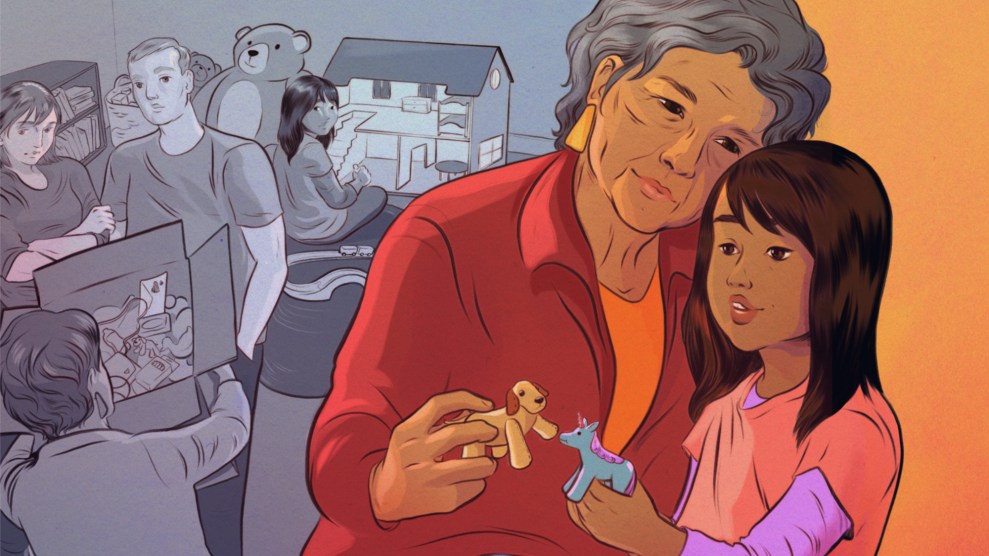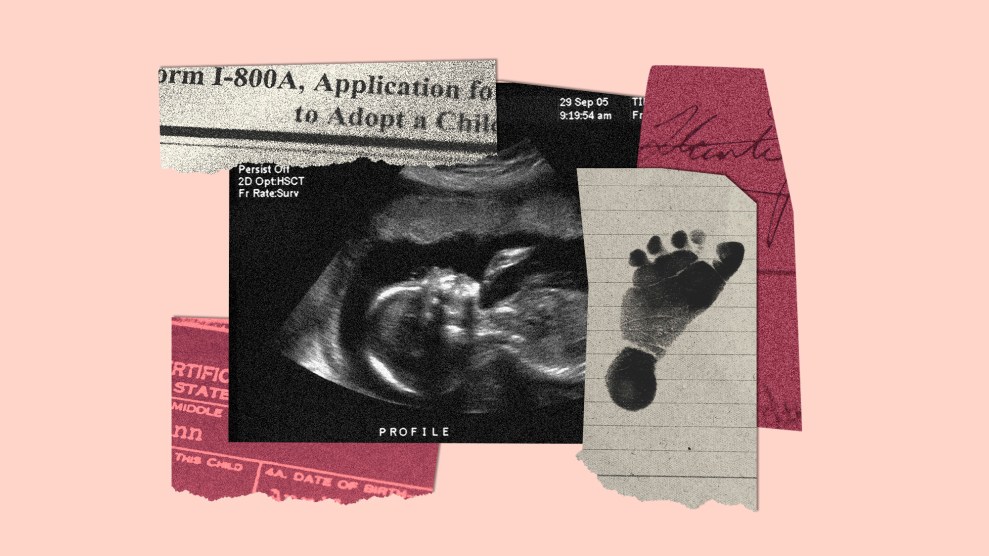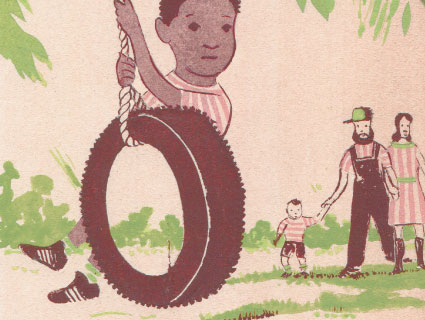
Mother Jones illustration; Macmillan; Liz Corman Photography
Cassie was a 22-year-old college student working a part-time job when she found out she was pregnant. It was too late for an abortion, and parenting seemed off the table: She felt too poor, too unsupported by her family.
When she went to an adoption agency, Cassie couldn’t stop weeping. But the staffers were warm, praising her for making the best decision for her child. They gave her a worksheet with two columns: things she could provide for her baby, and things adoptive parents could provide. They noted that adoptive parents could provide a home, a marriage, and financial stability. The agency sent her home with a stack of profiles of prospective adoptive parents, and one couple stood out to Cassie: a journalist and a fashion designer with a cute dog and a beautiful home. They agreed to an open adoption, in which Cassie would stay in touch with the family. Soon after giving birth, Cassie rolled her son in a bassinet down a hospital hallway to his adoptive parents.
It seemed like a successful adoption: a win-win for a baby who needed a home and parents who wanted a baby. But take a closer look at Cassie’s story, as sociologist Gretchen Sisson does in her forthcoming book, Relinquished: The Politics of Adoption and the Privilege of American Motherhood, and you see fissures in the narrative. Looking back on her pregnancy eight years later, Cassie sees that her support system—the adoption agency, her family—presented adoption, and not parenting, as the only viable option. She suspects that a little financial support would have significantly changed her decision. At the hospital, Cassie had second thoughts about adoption, but she felt she didn’t have time to consider those feelings. In a hormonal haze soon after delivering, she signed the paperwork terminating her parental rights. “If I could go back, I just wish I would’ve waited a couple days, because I wouldn’t have made the same choice,” Cassie told Sisson.
Cassie spiraled into a deep depression after the birth, her body aching for her son. The promise of an open adoption was fruitless; with the exception of one visit when her son was a toddler, she never saw him again. “It’s always depicted as a choice, right? It’s a choice you make,” Cassie told Sisson. “Yeah, it was my choice to go to the agency; it was my choice to choose adoption—but, like, it really wasn’t. It felt like my only option.”
Sisson, who researches abortion and adoption at the University of California-San Francisco, interviewed more than 100 American birth mothers who relinquished their infants for adoption. (The mothers’ names, including Cassie’s, were changed.) Sisson’s interest in adoption started in graduate school, when she was interning at a center for pregnant and parenting teens and volunteering on a hotline for people who wanted an abortion. Her experiences didn’t square with the cultural zeitgeist glorifying adoption—think The Blind Side, or Sex and the City, or, perhaps most notably, Juno, in which the titular character bikes off singing after handing her baby to her adoptive mother.
Politicians on both sides of the aisle have long praised adoption, too, as a rare common ground that has taken on particular salience in the post-Dobbs era. But, as Relinquished notes, the adoption industry has a long history of targeting vulnerable mothers—particularly women in poverty and women of color. Such mothers are rarely heard from in narratives about adoption, and their stories challenge assumptions many Americans have about how the industry works.
For example: Research shows that mothers are not typically weighing abortion and adoption as competing decisions. Most of the birth mothers who Sisson interviewed wanted to parent, but relinquished their children largely because of financial constraints. “When I asked the women who wanted to parent what they would have needed to do so, it was simple: money,” writes Sisson. Like Cassie, Sisson questions whether adoption is truly a choice. “[A]s people’s options are constrained, as abortion is unavailable and parenting is untenable, adoption becomes the only path forward,” she writes.
I spoke with Sisson about the myths and realities of infant adoption in America today. Her answers have been lightly edited for clarity.
The language you use to describe adoption—starting with the title of the book—feels very intentional. Why do you refer to mothers “relinquishing” their children rather than, say, “placing” them for adoption?
I wanted to make space for language that wasn’t as shaped by the adoption industry. “Placing” a child for adoption, “choosing” adoption—they convey a greater sense of agency and control over their lives than a lot of the women that I interviewed had at the time. “Relinquishing” represents this position of having less power, of having fewer resources, of being in a place where decisions are not entirely within your own control.
You make a point of underscoring that the decision for moms is often not between abortion and adoption. Can you talk more about that?
Most of the mothers I interviewed didn’t want to have an abortion. They wanted to parent. They continued their pregnancies because they intended to parent and they were in a crisis, and couldn’t find safe housing or affordable child care or the support of their partner or their own parents. Whatever was going to help them get through that crisis didn’t materialize, and that’s when they turned to adoption. There were some women in my sample who were interested in having an abortion but it was inaccessible to them, but they were the minority. And even they weren’t choosing between abortion and adoption. They wanted to get an abortion, they couldn’t get an abortion, then they turned to adoption. They weren’t choosing between the two; it was when they didn’t have access to one choice that the other became the possibility.
Adoption is one of the rare issues that has bipartisan support. What about adoption appeals to both parties?
There are the reasons that people state for being supportive of adoption, and then there are the reasons that people don’t talk about. Conservatives like to promote adoption as an alternative to abortion. We know that that is not how women make choices about their pregnancies; we know that women are not choosing between abortion and adoption at single points in their pregnancy. But it’s a useful talking point for conservatives who don’t want to act as if they’re imposing motherhood on someone. I also think that, from a “small c” conservative perspective, it’s a way of not having to invest in poor and vulnerable families, because so much of relinquishment is driven by poverty. And because adoption is largely the transfer of children and babies from poor families to at least middle-class families, then you are averting that need. Also, the majority of adoption in this country is facilitated by Christian adoption agencies. It’s about upholding a really heteronormative idea of family: a two-parent, married, heterosexual couple that are adhering to this fairly conservative idea of what families look like.
On the other side of the political spectrum, you see a lot of gay and queer parents are adoptive parents. My work intentionally doesn’t answer the question of what those parents should do if they find the way we practice adoption today to be unethical. Adoption as a system is supposed to be about finding homes for children who need them, not about finding babies for parents who want them. I also think that as more and more of our adoption in the United States is transracial adoption, the promise of white parents adopting children of color becomes this post-racial bona fide. I don’t think that’s why most of them do it, but I do think that there’s this idea that we can form families: biology doesn’t matter, race doesn’t matter, communities of origin don’t matter. Love is what makes a family. That’s this progressive liberal idea, and it’s not actually born out in the impacts that we see for adopted people and their families.
The Supreme Court overturned Roe v. Wade while you were working this book. How will (or won’t) Dobbs change the adoption industry?
We saw from the Turnaway Study that when you deny people access to abortion, the vast majority of them are parenting. So you’re not going to have a huge surge in adoption. [The number of adoptions] is going to be vastly outnumbered by the number of people who are parenting children that they did not intend to parent at that time in their lives. And so this raises the question: How are we actually going to support these families?
A relatively small amount of money goes really far in keeping families together. And a lot of mothers I talked to, if they were saying, the reason why I had to relinquish my child is I didn’t have enough money, I’d say, well, how much would you have needed? The highest number I ever heard was $5,000. They don’t need enough to buy a house, or pay for schooling until the kid’s 18. What they need is enough to get through that crisis—of figuring out how to get from where they are at the end of their pregnancy to a safe and stable home. Sometimes, it’s a security deposit. Sometimes it’s a car. Sometimes it’s a voucher for child care. It’s not usually this massive, massive investment.
You’ve studied marketing tactics that adoption agencies use to reach expecting mothers, some of which are quite predatory. What are some common strategies?
The number one expense of most adoption agencies is in marketing, and a lot of that is Google ads. They spend more on marketing than they do on legal fees, than they do on support for birth mothers. There’s this idea that adoption is so expensive because that money has to go towards supporting the birth mother during her pregnancy, and that actually very rarely happens at any meaningful level. The most expensive thing about adoption is ads that are going into recruiting pregnant people into giving up their children. A lot of times, agencies buy keywords like “help for single moms in California.” They’ll buy that search string, so if you are pregnant and looking for information about how to get into affordable housing, or how to find child care, you’re going to get recurring ads for adoption agencies. It’s really heavily tailored to target not just people who are Googling things about adoption, but anything that suggests that you are pregnant and intending to parent, and need help doing that. We also saw agencies that are geofencing, so if you’re using your phone and you’re at a Planned Parenthood or you’re at another abortion clinic, you might start getting ads for adoption agencies.
A lot of these ads can be really compelling to mothers that are not sure what they’re going to do, and aren’t quite sure where they’re going live when the baby gets here. Are they still going to be living in their car? Are they going to be able to find housing? All of a sudden, you’re getting these ads from adoption agencies with profiles for prospective adoptive parents with these gorgeous suburban homes with big backyards and pools. They talk about their public school system and their lucrative careers. It becomes this way of showcasing class privilege and stability—not just financial stability, but marital stability, family support. Exactly the things that a lot of relinquishing mothers feel they’re lacking. That really speaks directly to a lot of the insecurities that these pregnant people feel.
What are some common misconceptions about adoption? What do you wish that more people knew?
We have this idea that there are so many babies in need of homes. In fact, the demand for babies dwarfs the number of babies that are actually available for adoption. Estimates put it at between 10 and 45 waiting families for every baby that’s relinquished through private adoption. Bethany Christian Services, which is one of the biggest adoption agencies in the country, stopped accepting applications from prospective adoptive parents—there just weren’t enough babies. People don’t actually want to give away their children if they don’t have to. I think the biggest myth is that engaging in the private adoption system is an altruistic thing to do. We don’t need more prospective adoptive parents in private adoptions.
For people who can’t have their own kids, do you think that adoption is an ethical practice to turn to given how adoption works in America today?
[Long pause] I don’t think so. It’s hard for me to say that. There are a lot of ethical people who participate in adoption and are really committed to the well-being of their children and to preserving relationships with their child’s birth parents. I believe that the system is unethical, given the extent to which it is premised on inequity and the extent to which it’s often predatory. I believe that you can have ethical players that participate in it and do the best they can, but I don’t think that that makes the way that we practice this morally correct.
Do you have experience in or with the adoption industry? If so, we’d love to hear from you.


















